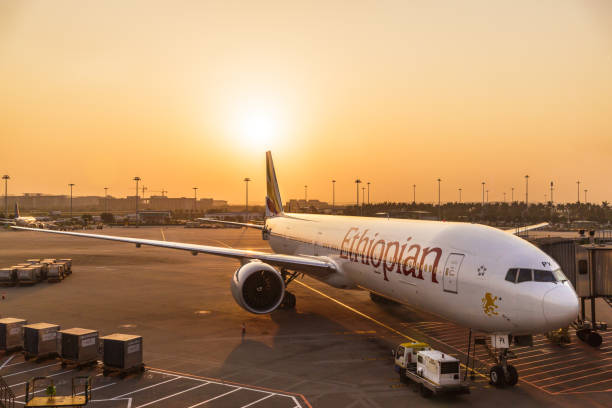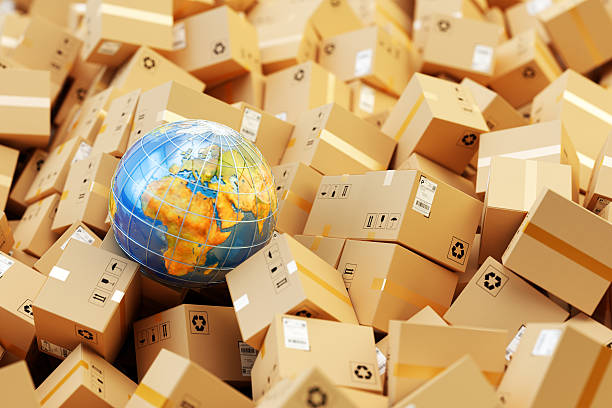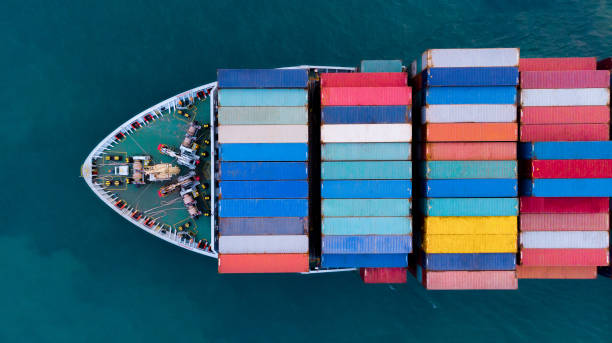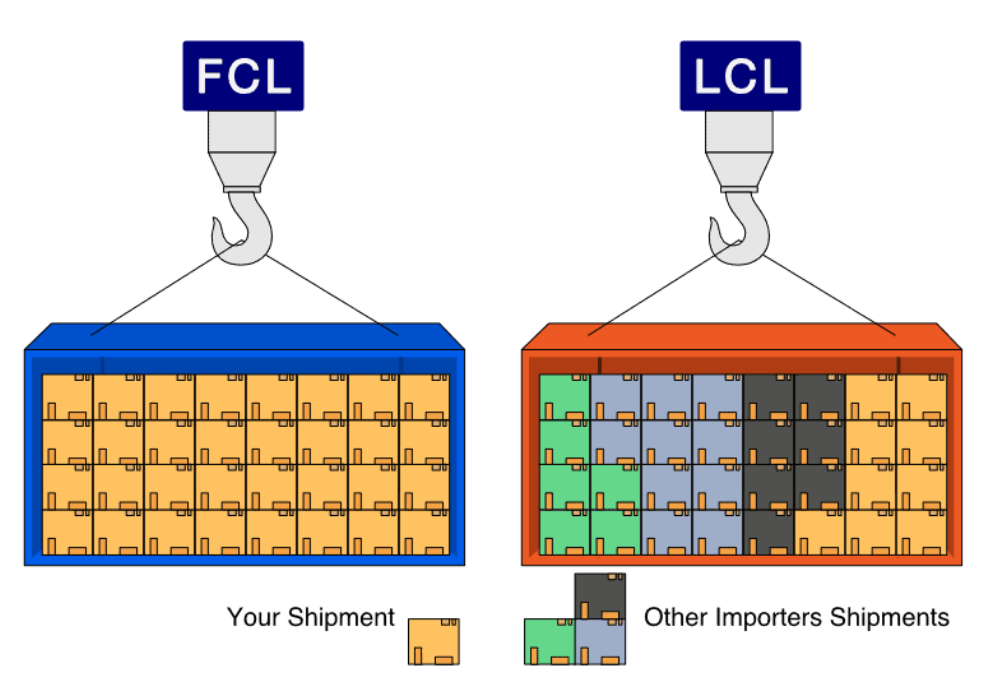Ethiopia is a country of great historical and cultural interest. It is located in northeastern Africa, with a population of about 120 million, rich in natural resources and potential for economic growth. Ethiopia's foreign trade activities mainly focus on exporting agricultural products, manufactured goods, and services. Although Ethiopia is a landlocked country with no coastline, it is still capable of maritime trade and international logistics through its transportation network connections with neighboring countries and reliance on ports and airports for international trade and transport. In this guide, we'll simplify the entire process of shipping to Ethiopia for you, and you'll gain a comprehensive knowledge of shipping to Ethiopia so you can make informed, efficient decisions and ensure that your shipment arrives in Ethiopia without incident.
Shipping to Ethiopia: The Definitive Guide to 2024
Shipping to Ethiopia involves many factors that will affect the transportation process's overall cost, time, and efficiency. Some of the critical factors include the selection of the appropriate mode of transportation, the quantity and type of cargo, the specific Port of destination Ethiopia, and the route chosen.

The whole process of shipping to Ethiopia
When you choose to ship your goods to Ethiopia, here is an overview of the entire shipping process:
Knowing the import regulations: It is essential to know the import regulations in Ethiopia before transporting goods. It is necessary to know the goods' value, type, HS code, and quantity and whether any licenses or certificates are required.
Preparation and Packing: First, you must prepare the goods you want to ship and pack them properly. Ensure that the goods are well packed to prevent damage during transportation. If there are special packaging requirements or restrictions, follow the regulations.
Export Documents and licenses: Depending on the nature and value of the goods, you may need to prepare specific documents and permits. For example, commercial invoice, and packing List. Please note that export licenses and other documents are required for certain goods. Please check with your supplier or freight forwarder to make sure you understand and meet all Export requirements and procedures in the export country.
Mode of Transportation Options: Choose the appropriate transportation mode based on your cargo type and budgetary considerations. Usually, there are three options: air transportation, express shipping, and sea transportation. Air transportation is fast but relatively expensive; sea transportation is less expensive but takes longer. You can also choose multimodal transportation, combining multiple modes of transportation.
Freight Forwarder Selection: Make sure you select a freight forwarder with extensive experience in shipping to Ethiopia. You can make an informed choice by searching the Internet, referring to others' reviews, or consulting a professional. If you are shipping from China to Ethiopia, we are the ideal freight forwarder for you.
Customs Clearance: Customs clearance is required once the goods arrive in Ethiopia. Ensure you provide all the necessary documents and information to pass the customs inspection smoothly. This may include invoices, packing lists, transport insurance, and import licenses.
Local Delivery and Pickup: Once the goods are successfully cleared through customs, the logistics service provider will arrange for pick-up and local delivery.
Congratulations! After this long journey, you get your shipments in Ethiopia!
Shipping to Ethiopia might be a challenging task for you as it is subject to the country's customs and import regulations, applicable duties, and VAT. In addition, the freight forwarder's role is to provide you with a worry-free shipping solution to ensure that your cargo reaches its destination safely, quickly, and at affordable costs...
Air transportation to Ethiopia

Air freight is the fastest and most expensive way of transporting goods from China to Ethiopia, especially for high-value and time-critical cargoes. By loading cargo onto an airplane, it is possible to transport cargo from China to its destination in Ethiopia within a few days. If your cargo is less than two cubic meters and less than 300 kilograms, and you have high demands on time, air transportation is the most efficient solution!
When the value of the cargo is high, choosing airfreight can ensure that the cargo is safe and fast while also providing higher insurance coverage. Although airfreight is more costly, it can make significant economic sense and be profitable for certain specific types of cargo and emergencies.
Air transportation considerations
In addition to the urgency and high shipping costs we mentioned above, there are several important considerations to take into account when selecting cargo to be shipped by air:
Cargo Characteristics: It is essential to understand the characteristics of the cargo you want to transport. Cargo weight, volume, shape, fragility, battery Properties(if containing batteries), and special requirements (e.g., temperature control or hazardous materials) can all influence the selection of the right airfreight solution. Some cargoes may require special packaging, handling, and transportation conditions.
Destination and routes: Consider the destination of the cargo and the available routes. Different routes may have different flight frequencies, transit time, reliability, and costs. Some destination airports may have limited direct flights, while others may require transit.
Weather impact: Adverse weather conditions have a more significant impact on air transportation. Airports may be closed, and aircraft may be grounded, resulting in longer transportation times.
These factors need to be considered when choosing a mode of transportation. If the shipment is too large (i.e., longer than 3m), or has a limited budget, you may need to consider ocean freight.
Major airports
Chinese airports available for transportation to Ethiopia
Transportation to Ethiopia is public from some of the significant Chinese airports listed below:
Beijing Capital International Airport (PEK): As one of China's busiest airports, Beijing Capital International Airport connects to a network of flights worldwide, offering a wide choice of international flights.
Shanghai Pudong International Airport (PVG): As one of China's busiest cargo airports, Shanghai Pudong International Airport (SPIA) offers several international cargo routes connecting many international destinations.
Guangzhou Baiyun International Airport (CAN): Guangzhou Baiyun International Airport is one of the major international airports in the southern region of China, with many international flights and cargo flights to different destinations.
Hong Kong International Airport (HKG): As a central aviation hub in Asia, HKG offers a wide range of international flights and cargo flights connecting to Ethiopia.
Changsha Huanghua International Airport(CSX): CSX offers a 1-day direct flight shipping to ADD, Ethiopia.
Ethiopian airports imported from China
The main international airport in Ethiopia is Addis Ababa Bole International Airport (ADD). The airport is located in Addis Ababa, the capital of Ethiopia, and is one of the busiest airports in Africa. Addis Ababa Bole International Airport is a significant destination and transfer point for many international flights, connecting to a network of flights worldwide.
Air transportation time from China to Ethiopia
Air freight time depends on factors such as airline flight schedules, cargo handling, weather, and customs clearance procedures; the following is the average air freight time for delivery from China to Ethiopia:
| Port to Port (days) | Door to Door (days) |
| 1-6 | 4-15 |
Cost of Air Freight from China to Ethiopia
Prices for general cargo shipping from China to Ethiopia average $5-8 per kilogram.
Freight rates for air transportation are affected by fluctuations in fuel prices, and therefore, prices may vary. It is important to note that there is no fixed rate standard for air freight, and the freight rate per kilogram decreases as the size of the shipment increases. It is best to contact your freight forwarder to get an accurate quote when your shipment is ready.
Get the latest air freight quote for shipping from China to Ethiopia.
Express shipping to Ethiopia from China

Express shipping from China to Ethiopia is a swift and efficient way. You can choose reputable courier companies, such as DHL, FedEx, UPS, and EMS, who provide fast delivery services worldwide. You can also choose to go through reliable freight forwarders like Jike Logistics, who usually cooperate with courier companies, and the price will be better than the price offered by courier companies.
Express transportation is the most expensive way of transportation compared to other ways of transportation, but you can receive your goods in the shortest possible time. It is especially suitable for goods with small weight (less than 200 kg). Based on our shipping experience, we suggest you use a UPS courier to ship from China to Ethiopia because it is the cheapest in most cases.
With express transit, your goods will be delivered to Ethiopia quickly, providing you with a convenient and reliable international logistics solution.
Express Shipping Costs from China to Ethiopia
The cost of express shipping from China to Ethiopia will vary according to different international mainstream couriers and cargo characteristics. Commonly, the shipping cost per kilogram is about $10 to $15. The exact price depends on the size and weight of the shipment and other factors.
You can choose a courier company according to your preference or take our advice to get a 30% lower price than the courier company. We offer a competitive courier service and are always committed to providing a high-quality service to ensure your goods arrive safely at their destination in Ethiopia. To get an accurate quote, please get in touch with us directly, and we will provide you with the appropriate quote information.
Get an Express Shipping quote for shipping to Ethiopia
Express shipping time from China to Ethiopia
Usually, express shipping from China to Ethiopia takes about 5 to 10 working days to ensure the shipment reaches its destination quickly. However, the exact transit time may be affected by several factors, such as the customs clearance process, the distance from the location, and the speed of the shipping company's service.
Sea freight from China to Ethiopia

Located in East Africa, Ethiopia is a landlocked country. Still, it is connected to neighboring countries through its transportation networks and relies on its ports and airports for international trade and shipping by sea. Sea freight is the most cost-effective option for Ethiopia, especially for shipments over 200 kilograms. Sea freight usually has lower costs compared to air freight. It offers door-to-door, door-to-port, or port-to-port services, providing flexibility for your logistics needs.
One of the advantages of ocean freight is its ability to carry larger quantities and goods of varying sizes, even large items such as automobiles. Ocean freight is a viable option whether you are a large-scale or small-scale importer. LCL (Less than Container Load) ocean freight is a good option for small-scale importers. Instead of renting an entire container, you only pay for the needed space. This method offers flexibility and economy and is perfect for your needs.
Options for FCL and LCL transportation to Ethiopia

You can rent an entire container(FCL) to transport your goods for total shipping. If your goods are large enough to fill a container or take up most of the container's space, then choosing FCL transportation is the most economical and efficient option. Total container shipping is also faster because your goods are stored separately from other cargo, eliminating the need for assembly and disassembly processes. Of course, if you want to keep your container sealed during transportation, you should choose FCL transportation.
Consolidation shipping (LCL) is when your shipment shares container space with another company's shipment. This is a more economical option, and if you don't have enough cargo to fill half the space of an entire container, consolidation shipping is a good option. However, it is essential to note that consolidation shipping can take longer due to the assembly and disassembly process. Your shipment will be stored in a containerized warehouse in China before departure. Upon arrival, it will be held in a warehouse in Ethiopia before being shipped to your address.
Whether you ship a full container or a consolidated shipment, your container will remain sealed throughout the shipment unless customs officials decide to inspect it. This ensures the security of your cargo. Your goods will remain locked in an entire container shipment until they reach their destination.
Transportation to major Ethiopian ports
China's major sea ports
The main shipping ports in China for shipments to Ethiopia are Shanghai, Qingdao, Shenzhen, Guangzhou, Dalian, Tianjin, Xiamen, and Macau.
Main maritime ports in shipping to Ethiopia
Two ports can receive shipments by sea, and it is recommended to consider the Port that is closer to the final destination:
Djibouti Port: Djibouti Port is one of the most important seaports for deliveries to Ethiopia and is located in Djibouti, neighboring Ethiopia. It is the leading import and export port of Ethiopia and provides an important trade route for Ethiopia through the rail and road links between Djibouti and Ethiopia.
Somalia Ports: Ethiopia also uses the ports of neighboring Somalia for international trade. Somali ports such as Berka, Beira, Kismayo, and Marka provide Ethiopia with access to imports and exports.
Sea Freight Shipping Time from China to Ethiopia
Below are the shipping times from China to Ethiopia for reference only:
| Type of service (standard container) | Port (China) to port (Ethiopia) | Door to door |
| Full container (FCL) | 20-40 days | 30-50 days |
| Consolidation (LCL) | 30-50 days | 40-60 days |
Ocean freight from China to Ethiopia
Transportation costs from China to Ethiopia vary depending on the Port of departure, Port of destination, type of cargo, mode of transportation, unique nature of the cargo, pricing of the logistics company, market supply and demand, and other factors.
To give you an initial price, here are the average transportation costs for shipping a container from China to Ethiopia:
| Container size | Cost |
| 20 feet. | $1750-$3,900 |
| 40 feet. | $2,200-$5,500 |
Get the latest ocean freight quote for shipping from China to Ethiopia.
Customs clearance requirements for shipping to Ethiopia
You must comply with Ethiopian customs clearance requirements when shipping goods to Ethiopia. This knowledge will help ensure your shipment complies with all necessary laws and regulations, avoiding delays and additional costs.
Import regulations
Ethiopia has specific import regulations in place to control the entry of goods into the country, and it is critical to ensure that your goods are allowed to be imported or whether a license or other special permit is required; below are some standard import regulations and procedures:
Import License: Certain goods may require an import license to enter Ethiopia. These goods include certain foodstuffs, medicines, chemicals, agricultural products, etc. You must contact the relevant Ethiopian authorities before shipping to find out if an import license is required.
Customs duties and taxes: Imported goods are subject to customs duties and other applicable taxes and fees. Duty rates and taxes vary depending on the type and value of the goods and the relevant regulations. You will need to pay these fees to Ethiopian Customs.
Value assessment: The value of the goods will be used to calculate duties and taxes. You will need to provide accurate information on the value of the goods and ensure compliance with Ethiopian Customs requirements.
Labeling and Packaging Requirements: Goods must be labeled to meet Ethiopian requirements. This includes correct packaging materials, necessary label information (e.g., product name, specifications, place of origin, etc.), and safety and health standards compliance.
Restricted and Prohibited Goods: Certain goods may be limited or prohibited from being imported, such as weapons, drugs, dangerous goods, etc. It will help if you ensure that your goods do not fall under the prohibited or restricted import category.
Inspection and certification: Certain goods may be subject to inspection and specific accreditation to ensure compliance with Ethiopian standards and requirements. This may involve inspection and certification of product quality, safety, health standards, etc.
Documentation requirements
Documentation is an essential aspect of the importation process. Some of the documents required to import goods into Ethiopia include:
Commercial Invoice: Please ask your supplier/seller to provide
Packing List: Please ask your supplier/seller to provide
Bill of Lading: A document issued by the carrier detailing the goods being shipped, their origin, and destination.
Form M (if needed): To declare their intention to import goods into Ethiopia
Product Certificate(if needed): Issued by a recognized certification body, this document certifies that the imported goods comply with the required standards and regulations
Combined Certificate of Value and Origin (CCVO)(if needed): required by Ethiopian Customs to validate and assess duties on imported goods.
Working with a reliable freight forwarder, such as JIKE Logistics, is critical to ensure that all documents are completed accurately and promptly.
Ethiopia import taxes and customs fees
Ethiopia's customs tariffs cover several areas, including import duties, value-added tax, and tariff quotas.

Here are some everyday customs duties:
Import tax: The import tax rate varies depending on the type of goods. The tax rate on imported goods in Ethiopia usually ranges from 0% to 35%, with some high rates applying to luxury goods and specific categories.
Export tax: export goods are exempted from export tax (except for very few goods, e.g. coffee).
Value Added Tax (VAT): Ethiopia levies a 15% VAT, which applies to imported and locally produced goods and services.
Tariff Quotas: For some specific commodities, such as grains, sugar, and textiles, Ethiopia has a tariff quota system. This means that imports of these commodities must be limited in quantity for a certain period.
Import duty product category (shipments in the order will be charged the relevant duty at this rate)
| Form | Tariff |
| Cell phone | 20% |
| Tablet computer (iPad, Android devices, etc.) | 20% |
Laptops | 20% |
| At the opportune moment | 20% |
| Replacement (parts) | 20% |
| Health & Beauty | 20% |
| wristwatch | 20% |
| pearls | 6% |
| Pet Accessories | 12% |
| Dry rations and supplements | 14% |
| Domestic electric appliances | 20% |
| Home decoration | 20% |
| Toys | 20% |
| Baggage | 20% |
| Audio-video | 20% |
| File | 0% |
| Books and collections | 1% |
Restricted and prohibited items for shipping to Ethiopia
Knowing the import laws of each country is important for smooth business, and Ethiopia has its list of prohibited items. Below are some of the key items that are prohibited from being imported:
ethanol CH3CH2OH
wildlife
chemicals
currency
medicaments
pyrotechnics
a gun
fresh food
vegetative
torrent
non-tobacco
Paints and non-hazardous materials
Stones and Stamps
curios
The list of restricted items changes frequently, so checking the official customs page before sending your shipment is a good idea.
Handling of fragile and valuable items during shipping to Ethiopia
When shipping fragile and valuable items to Ethiopia, proper precautions must be taken to ensure that the items are not damaged during transportation.
Here are some best practices to follow:
Valuables
Choose appropriate packaging materials: Use sturdy cardboard boxes, bubble wrap, stuffed peanuts, or other materials to protect items from crushing or bumping.
Clearly labeled packages: Marking fragile items on packages prompts people to handle them carefully.
Filling Packaging Voids: Use packaging materials to fill all voids in the carton to prevent items from shaking or shifting during transportation.
Avoid Overpacking: While it is essential to ensure that items are securely packaged, avoid overpacking, which can lead to package breakage or damage to the item.
Fragile item
Use sturdy packaging: Choose boxes made with durable materials, such as corrugated cardboard, to provide an extra layer of protection.
Use cushioning material: Pack each valuable item individually in bubble wrap or foam and use additional cushioning material to fill empty spaces in the box.
Consider insurance: Consider purchasing additional insurance to protect your valuables during transportation in case they are lost or damaged.
Choose a reliable shipping company: work with a reputable shipping company such as JIKE Logistics, which can provide professional handling and extra security.
Addressing transportation delays or problems
Deliveries to Ethiopia can encounter a considerable number of delays and unforeseen problems. Despite taking all the necessary precautions, situations that are out of your control may arise, so it's crucial to know how to handle them. Here are some tips for resolving shipping delays or issues when shipping to Ethiopia:
Stay informed: Track the progress of your shipment with our online tracking service. This allows you to stay current with any potential delays or issues.
Contacting Customer Support: In case of any problems or delays, please get in touch with JIKE Logistics' customer support team immediately. They will provide you with up-to-date information and try to resolve the issue as quickly as possible.
Please be aware of customs requirements: Customs requirements in Ethiopia can be complex, and non-compliance may result in delays in shipment. Make sure your shipment meets all documentation and packaging requirements.
Consider shipping insurance: If you are shipping valuables, consider purchasing shipping insurance to protect yourself from damage or loss.
Plan for delays: Deliberations to Ethiopia can take longer than expected for various reasons, such as customs clearance or weather conditions. Plan accordingly and allow plenty of time for your shipment to arrive.
Be Patient: Despite the best-laid plans, shipping delays or problems can still occur, leading to frustration and anxiety. Please be patient and communicate with JIKE Logistics' customer support team, who will resolve the issue promptly and efficiently.
Keeping these tips in mind, you can quickly deal with shipping delays or issues and ensure an excellent experience for shipping to Ethiopia through JIKE Logistics.
Work with a reliable freight forwarder in China: JIKE Logistics

To succeed in the Ethiopian market, choosing a logistics partner that understands the business environment in China and Ethiopia is crucial.
We highly recommend that you choose JIKE Logistics as your freight forwarder. We are committed to looking after your best interests and providing all-round support to help you succeed in Ethiopia. JIKE Logistics has the experience and expertise to help you understand China and Ethiopia's business environment and regulatory requirements. We offer comprehensive logistics solutions to ensure that your goods are exported from China to Ethiopia in compliance with local laws and regulations.
You will enjoy professional logistical support with JIKE Logistics, including accurate documentation requirements, customs brokerage, cargo transportation management, and smooth communication and cooperation with local partners. Our team has the cross-cultural communication skills to communicate and collaborate efficiently with our business partners in Ethiopia.
By choosing JIKE Logistics as your partner, we are confident that we can provide exceptional service and help you succeed in the Ethiopian market.
FAQs - Shipping to Ethiopia
| How can I ensure that my goods are declared for customs clearance correctly? |
| Please work closely with your freight forwarder/broker to ensure that all necessary documents are accurately completed and submitted for customs clearance. Doing so will help avoid delays or penalties due to incorrect or incomplete declarations. |
| How long does it take to ship a container from China to Ethiopia by ocean shipping? |
| Shipping time from China to Ethiopia is usually between 25 and 45 days, depending on the vessel, origin, and destination ports and the route chosen. |
| What is the best shipping method for shipping to Ethiopia? |
| Choosing the best mode of transportation will depend on your specific needs, budget, and the type of goods being transported. Air freight offers the fastest delivery times and is suitable for urgent or time-sensitive shipments, and express freight like UPS is suitable for goods less than 45kgs. Ocean freight, on the other hand, is better suited for larger shipments and is more cost-effective. Please choose the most suitable mode of transportation for your needs. |
| What should I do if customs detain my goods? |
| Contact your freight forwarder/broker for assistance if your shipment is detained at customs. They will assist you in determining the reason for the detention and guide you in resolving the issue to ensure a smooth customs clearance process. |
| When shipping to Ethiopia, what are the packaging requirements? |
| For safe transportation to Ethiopia, proper packaging is essential. Please ensure that items are securely packed with adequate cushioning and protective materials to prevent damage during transportation. |
Related Articles
View all articles
Shipping from China to Nigeria: Your Essential Guide
Discover essential tips and methods for shipping from China to Nigeria. Learn about customs regulations, logistics, and more for successful international trade.
15 September 2023
![Shipping to South Africa Guide | shipping agents from China to South Africa [2023]](/static/upload/image/20230726/1690338568684879.jpg)
Shipping to South Africa Guide | shipping agents from China to South Africa [2023]
As one of the most famous shipping agents from China to South Africa, JIKE Logistics will guide you on how shipping from China to South Africa works.
04 August 2023

Shipping from Hong Kong to US (2024 Full Guide) | Freight Forwarder in HK
With this guide, you will better understand the entire process of shipping from Hong Kong to US and be able to make informed decisions.
09 May 2024


Consult Our Experts